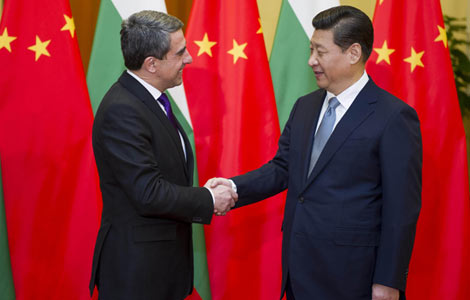In praise of CFIUS: US watchdog gets the job done
Updated: 2013-12-26 10:45
By Michael Barris (China Daily USA)
|
||||||||
What a difference six months makes.
Back in June, Senate Agriculture Committee Chairwoman Debbie Stabenow was calling for "special scrutiny" of Smithfield Foods Inc's proposed $4.7 billion purchase by Chinese meat processor Shuanghui International. Citing China's and Shuanghui's "troubling record on food safety", the Michigan Democrat said she saw "questions" about the "economic motivations" of the purchase, given that Smithfield, the world's largest pork producer, was struggling to make a profit, and here was Shuanghui, offering to pay a 30 percent premium for the company.
Ultimately, the Committee on Foreign Investment in the United States, or CFIUS, cleared the Smithfield purchase, allowing the largest Chinese takeover of a US company to be completed in the fall. What we can take away from that event, as a new year beckons, is that the US must continue to allow this inter-agency group chaired by the Treasury secretary, which reviews transactions that would bring US businesses under foreign ownership for national security concerns, to continue to play a large role in setting the tone for Chinese investment in the US. Its critics notwithstanding, the agency will become increasingly important in the months and years ahead, as the two nations' economies grow even more linked.

Without question, the Shuanghui-Smithfield deal highlighted 2013. Chinese corporations filed 23 notices with US regulators in 2012, up from 10 in 2011 and nearly quadruple the number in 2010, according to CFIUS's annual report issued last week. That compared with 17 notices from companies from the UK last year, the report said.
A senior Treasury official said in a statement that the higher number of Chinese deals under review was consistent with growing Chinese investment in the United States. His claim is borne out by Thomson Reuter's data which show $11.5 billion worth of deals by Chinese companies were made in the US last year - significantly more than in any year other than 2007.
As numerous trade missions in the past year by California, Michigan, Washington, Virginia and other states show, US politicians want to attract Chinese investment as a source of jobs and economic growth. And, despite the 2005 rejection of China National Offshore Oil Corp's $18.5 billion attempt to buy US energy company Unocal because of national security concerns, China also is becoming more comfortable with doing deals in the US.
Particularly revealing is the CFIUS report's statement that the agency no longer sees some foreign governments as having a coordinated strategy to acquire valuable US technology by buying US firms, as it saw happen in 2011. Only six of China's 2012 transactions involved "critical technology companies" such as defense, nuclear and toxins, compared with 28 from the UK, 13 from France and 10 from Japan, according to the report. Nevertheless, the report said that "foreign governments are extremely likely to continue to use a range of collection methods to obtain critical US technologies".
Six months' hindsight suggests that CFIUS proved its value at the height of the Smithfield acquisition objections voiced by Stabenow and others, by doing its job as an objective guard of US interests. As the futures of the US and China become inextricably linked, CFIUS's function will be of major importance in affecting not only US-China relations, but the overall health of the US economy.
Contact the writer at michaelbarris@chinadailyusa.com
(China Daily USA 12/26/2013 page2)

 Detroit auto show features fuel-efficient cars
Detroit auto show features fuel-efficient cars
 Palestinian students show military skills
Palestinian students show military skills
 Cristiano Ronaldo wins FIFA best player award
Cristiano Ronaldo wins FIFA best player award
 Xuelong carries on mission after breaking from floes
Xuelong carries on mission after breaking from floes
 Beijing and Sofia vow new initiatives
Beijing and Sofia vow new initiatives
 71st Golden Globe Awards
71st Golden Globe Awards
 Bangkok unrest hurts major projects and tourism industry
Bangkok unrest hurts major projects and tourism industry
 No pant for cold subway ride
No pant for cold subway ride
Most Viewed
Editor's Picks

|

|

|

|

|

|
Today's Top News
Air China ups Houston-Beijing service to daily
Two students hurt in New Mexico school shooting
Chinese have new friend for US tours
15 flu-related deaths reported in Arkansas, US
New workstation in Silicon Valley
At least 16 dead in E China factory fire
Xi calls for reform to fight graft
S. China Sea rules no threat to peace
US Weekly

|

|






